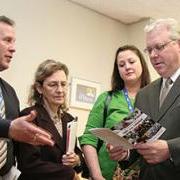 Calls to allow so-called flexibility on SUNY campuses have grown among some campus presidents and SUNY administrators as the state’s fiscal crisis has worsened. Calls to allow so-called flexibility on SUNY campuses have grown among some campus presidents and SUNY administrators as the state’s fiscal crisis has worsened.
In general, the theory is the University would benefit financially if individual campuses are unshackled to allow both differential tuition and the sale or lease of SUNY property without approval from the state Legislature.
UUP has worked tirelessly to debunk this theory. The union’s efforts succeeded in eliminating proposed flexibility provisions in the 2009-10 state budget.
But the campaign to gain legislative approval for flexibility continues. Lawmakers are discussing not only the A./S. 2020 bill specific to the University at Buffalo, but other proposed legislation to allow the unfettered sale or lease of state property at the university centers at Stony Brook, Binghamton and Albany, as well as at SUNY teaching hospitals in Brooklyn and Syracuse.
UUP President Phillip Smith warns that tuition could increase as much as 30 percent if UB gained the ability to set its own tuition. He said an increase of this magnitude is not in the best interests of current and potential students and their families, many of who rely on public higher education in these tough economic times.
“Consider a high school graduate from Buffalo who wanted to pursue a degree in engineering, but could not afford to go out of town,” Smith said.
“If UB’s tuition rose dramatically, this student—as well as many others—would be denied access to an affordable public higher education. Such a scenario is not in line with SUNY’s mission, which is to provide a quality education for the greatest number of New Yorkers,” he said.
Smith fears SUNY’s goal of educating future generations of New Yorkers would be further undermined by allowing campuses free reign to sell or lease campus buildings or property.
“Surely, the primary aim of every SUNY campus is to educate,” Smith said. “But giving campuses blanket authority to do whatever they want with taxpayers’ property is bound to have the opposite result.”
Smith maintains there is considerable evidence that flexibility would harm campuses and no evidence it would help.
Both UUP and SUNY agree that the University is an engine of economic growth. Proponents of flexibility, particularly those in Buffalo, insist it is key to that region’s economic resurgence. But Smith contends that SUNY doesn’t need flexibility to wield its economic potential.
“Campuses already possess the capability to contribute to the state’s economy,” Smith said. “Requiring legislative approval of campus property transactions is not a barrier to economic growth. It serves to protect the needs of both students and faculty.”
— Donald Feldstein |


